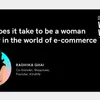After unicorn ShopClues, Radhika Ghai enters wellness space with Kindlife targeting Gen Z
Radhika Ghai started Kindlife in December 2021 as a wellbeing ecosystem complete with an ecommerce marketplace and a community. Bound by ‘kind codes’, the platform aims to help Gen Z and late millennials lead a kind life.
In July 2011, Gurugram-headquartered , co-founded by Radhika Ghai, was the thirty-sixth entrant in India’s ecommerce market. In 2016, ShopClues became India’s fourth unicorn.
The country’s first managed marketplace was founded in July 2011 in Silicon Valley by Sandeep Aggarwal, Sanjay Sethi, and Radhika Ghai, to target consumers in Tier II and III markets, with wider selections to lower price points, setting itself apart from the likes of Amazon and Snapdeal at the time.

In December 2021, Radhika founded her second venture, , a wellbeing ecosystem, complete with an ecommerce marketplace and a community.
The platform aided by a rigorous algorithm works with the “kind code”, specific to Kindlife, to onboard brands in clean beauty, nutrition and home care. Its promise is simple–no toxins, no trash, no trolls.
“I feel like a proud mommy right now. When one looks at the entire startup ecosystem, it’s fascinating how my last 10-12 years as an entrepreneur have panned out. When I read the news of Purplle turning a unicorn, I remembered the feeling of super-excitement when ShopClues became one,” Radhika tells HerStory.
She recalls that at the time, starting ShopClues was an extremely risky move as there weren’t many startups around.
Compare that to now and Radhika says it’s heartening to note that the country’s heroes are startup founders and the change in culture is welcoming.
“I feel incredibly proud to have been part of the entire journey and whatever contribution I have been able to make to the ecosystem. There were so few of us women then, and with every woman-led company becoming a unicorn, it becomes a matter of great pride,” she says.

Radhika Ghai
Catering to conscious consumers
With Kindlife, Radhika aims to target Gen Z and later millennial consumers.
She explains, “There are 472 million Gen Z consumers in India–inherently digitally native, who spend over 10 hours a day online and consume short-form content. We are building Kindlife with a clear purpose of helping them lead a kind life, be kind to themselves, be kind to those around them, and be kind to the planet.”
For Radhika, it’s imperative that this “kindness” reflects in every product sold on the platform and every piece of “communication and content”.
“The important characteristic of Gen Z consumers is that they are purpose-driven with transparency being key. Self-care and planet care go hand-in-hand, values matter, and personal and business goals with sustainability must align,” she adds.
This, she believes, puts Kindlife in a plum position to be a platform for choice for Gen Z.
Radhika objects to Kindlife being categorised as a niche segment.
“In reality, kind living, better living, and pure living fall under a niche segment. But in reality, they do not. Ninety percent of D2C brands that have come up recently follow one of the kind codes–whether it’s with the ingredients or even the fact that they are homegrown that bring a strong value.”
According to Radhika, Kindlife aims to build a new-age beauty and wellness ecosystem by enabling commerce, community, and brands.
COVID-19 has been the inflection point for consumers to realise the importance of the adoption of clean and kind brands.
“COVID-19 made us all realise what our mortality is—that this is one life, we have to live and for that, we need to look after ourselves. We've also realised that this is the only planet we have to look up to.”
Based on kind codes

Kindlife offers products for “on the body, in the body, and around the body”, and onboarding a brand on the platform is based on different parameters.
Radhika elaborates, “They must be plant-based, organic, toxin-free, eco-conscious, and cruelty-free. Our AI algorithm reviews nasty ingredients and they are red-flagged for a manual review. Third-party certifications are accepted and encouraged for a brand to be listed under the kind codes. So, this makes it easy for the consumer to view products as well as per the preferred values of kind codes. Consumers are also able to review products in grams as per their certifications as well.”
Is the wellness market in India easy to navigate?
“It’s not just about the products—we are building a community on the platform where one can ask questions, share their thoughts so that the whole process becomes transparent. Customers know that the first level of cleaning is already done by us, and we don’t have any products with nasties on the platform, and in the end, they have a certain sense of confidence that this is the right product for me, and that’s why I am buying it,” Radhika says.
Radhika calls herself a serial tester—she has tried most of the products on the platform, figuring out what she should be using, and what could become a game-changer.
In December 2021, Kindlife raised an undisclosed seed round led by Kalaari Capital.
Working with a 40-member team, Kindlife now has over 350 brands on the platform, out of which 60 percent have been onboarded organically.
It also claims to have built a strong community of over 90,000 consumers in six months, out of which 94 percent are under the age of 34.
Radhika shares that the brand has grown at an ARR (Annual Recurring Revenue) of $2 million and is growing 60 percent month-on-month.
“We are looking at Kindlife growing rapidly with innovation in community and commerce. We are also looking at launching some of our brands, starting with To Be Kind, our first hygiene brand. We also want to bring in international brands that are sustainability focussed,” she concludes.
Edited by Megha Reddy









